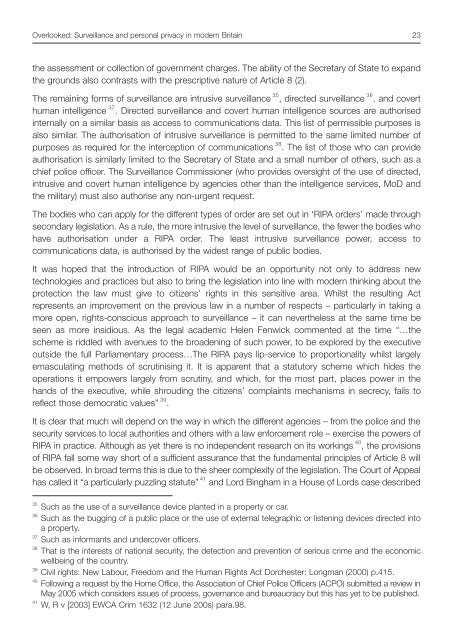Overlooked - Liberty
Overlooked - Liberty
Overlooked - Liberty
Create successful ePaper yourself
Turn your PDF publications into a flip-book with our unique Google optimized e-Paper software.
<strong>Overlooked</strong>: Surveillance and personal privacy in modern Britain 23<br />
the assessment or collection of government charges. The ability of the Secretary of State to expand<br />
the grounds also contrasts with the prescriptive nature of Article 8 (2).<br />
The remaining forms of surveillance are intrusive surveillance 35 , directed surveillance 36 , and covert<br />
human intelligence 37 . Directed surveillance and covert human intelligence sources are authorised<br />
internally on a similar basis as access to communications data. This list of permissible purposes is<br />
also similar. The authorisation of intrusive surveillance is permitted to the same limited number of<br />
purposes as required for the interception of communications 38 . The list of those who can provide<br />
authorisation is similarly limited to the Secretary of State and a small number of others, such as a<br />
chief police officer. The Surveillance Commissioner (who provides oversight of the use of directed,<br />
intrusive and covert human intelligence by agencies other than the intelligence services, MoD and<br />
the military) must also authorise any non-urgent request.<br />
The bodies who can apply for the different types of order are set out in ‘RIPA orders’ made through<br />
secondary legislation. As a rule, the more intrusive the level of surveillance, the fewer the bodies who<br />
have authorisation under a RIPA order. The least intrusive surveillance power, access to<br />
communications data, is authorised by the widest range of public bodies.<br />
It was hoped that the introduction of RIPA would be an opportunity not only to address new<br />
technologies and practices but also to bring the legislation into line with modern thinking about the<br />
protection the law must give to citizens’ rights in this sensitive area. Whilst the resulting Act<br />
represents an improvement on the previous law in a number of respects – particularly in taking a<br />
more open, rights-conscious approach to surveillance – it can nevertheless at the same time be<br />
seen as more insidious. As the legal academic Helen Fenwick commented at the time “…the<br />
scheme is riddled with avenues to the broadening of such power, to be explored by the executive<br />
outside the full Parliamentary process…The RIPA pays lip-service to proportionality whilst largely<br />
emasculating methods of scrutinising it. It is apparent that a statutory scheme which hides the<br />
operations it empowers largely from scrutiny, and which, for the most part, places power in the<br />
hands of the executive, while shrouding the citizens’ complaints mechanisms in secrecy, fails to<br />
reflect those democratic values” 39 .<br />
It is clear that much will depend on the way in which the different agencies – from the police and the<br />
security services to local authorities and others with a law enforcement role – exercise the powers of<br />
RIPA in practice. Although as yet there is no independent research on its workings 40 , the provisions<br />
of RIPA fall some way short of a sufficient assurance that the fundamental principles of Article 8 will<br />
be observed. In broad terms this is due to the sheer complexity of the legislation. The Court of Appeal<br />
has called it “a particularly puzzling statute” 41 and Lord Bingham in a House of Lords case described<br />
35<br />
Such as the use of a surveillance device planted in a property or car.<br />
36<br />
Such as the bugging of a public place or the use of external telegraphic or listening devices directed into<br />
a property.<br />
37<br />
Such as informants and undercover officers.<br />
38<br />
That is the interests of national security, the detection and prevention of serious crime and the economic<br />
wellbeing of the country.<br />
39<br />
Civil rights: New Labour, Freedom and the Human Rights Act Dorchester: Longman (2000) p.415.<br />
40<br />
Following a request by the Home Office, the Association of Chief Police Officers (ACPO) submitted a review in<br />
May 2005 which considers issues of process, governance and bureaucracy but this has yet to be published.<br />
41<br />
W, R v [2003] EWCA Crim 1632 (12 June 200s) para.98.















